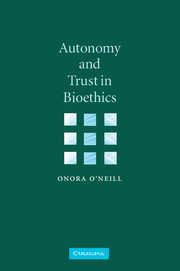Book contents
- Frontmatter
- Contents
- Preface
- Frontispiece
- 1 Gaining autonomy and losing trust?
- 2 Autonomy, individuality and consent
- 3 ‘Reproductive autonomy’ and new technologies
- 4 Principled autonomy
- 5 Principled autonomy and genetic technologies
- 6 The quest for trustworthiness
- 7 Trust and the limits of consent
- 8 Trust and communication: the media and bioethics
- Bibliography
- Institutional bibliography
- Index
6 - The quest for trustworthiness
Published online by Cambridge University Press: 06 November 2009
- Frontmatter
- Contents
- Preface
- Frontispiece
- 1 Gaining autonomy and losing trust?
- 2 Autonomy, individuality and consent
- 3 ‘Reproductive autonomy’ and new technologies
- 4 Principled autonomy
- 5 Principled autonomy and genetic technologies
- 6 The quest for trustworthiness
- 7 Trust and the limits of consent
- 8 Trust and communication: the media and bioethics
- Bibliography
- Institutional bibliography
- Index
Summary
UNTRUSTWORTHY EXPERTS AND OFFICE HOLDERS
Discussions in bioethics have been marked by recurrent and deep-seated worries that experts and officials, governments and business may all be untrustworthy. In areas of concentrated specialisation and expertise, including medicine, science and biotechnology, asymmetries of power and knowledge are common: how then can inexpert patients, citizens or customers judge the experts? Can patients trust their doctors to have their best interests at heart? Can the public trust governments and their multiple agencies to regulate and fund science with proper caution and in the public interest? Should consumers trust biotech companies, whose products are developed for profit, not for public benefit? Isn't it rational to mistrust experts and officials, companies and government agencies, and to try to improve the ways in which the public can hold them to account? This litany of worries may suggest that since untrustworthy action is easy and widespread, the only safe course of action is to place no trust, thereby ensuring that no trust is misplaced.
Untrustworthy behaviour by some doctors, scientists, biotechnology companies and government agencies provides some evidence for these suspicions. The most common, although not the worst, instances of misplaced trust in doctors and hospitals are the afterglow of paternalism in and beyond medicine. It can be all too easy to calm a patient's fears with an anodyne or euphemistic description of proposed medical procedures and their effects.
- Type
- Chapter
- Information
- Autonomy and Trust in Bioethics , pp. 118 - 140Publisher: Cambridge University PressPrint publication year: 2002



